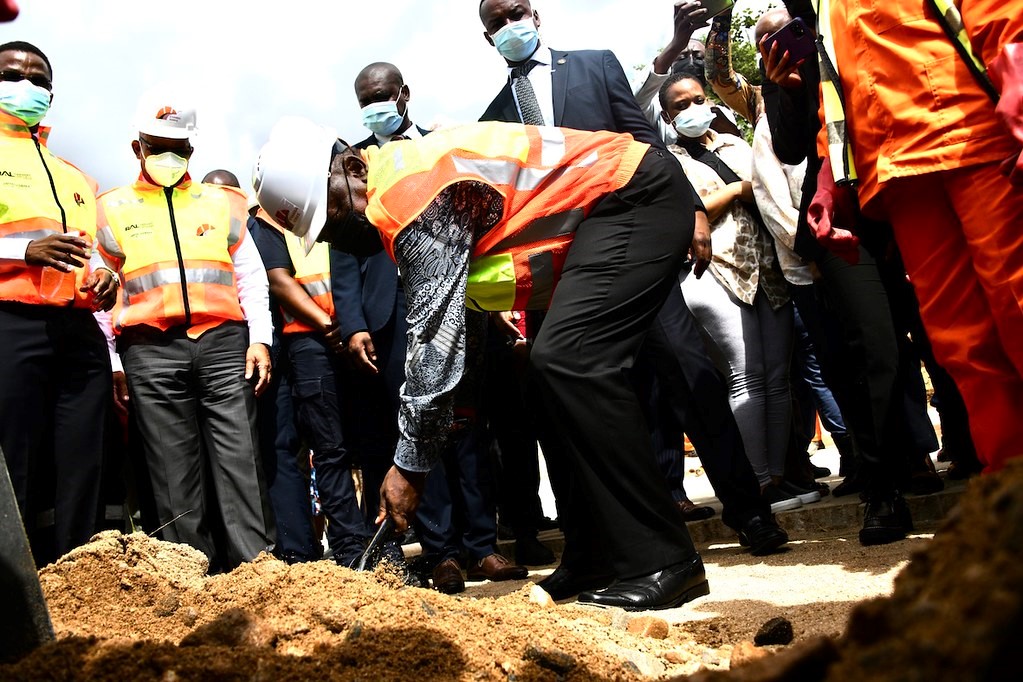CHARLES MOLELE|
PRESIDENT Cyril Ramaphosa said on Thursday that infrastructure is central to South Africa’s economic reconstruction and recovery, announcing R100 billion worth of projects over the next ten years to build bridges, schools, piplines, sub-stations, water treatment works, landfills, fresh produce markets, including over 700km stretch of roads networks.
The president was delivering his sixth State of the Nation Address (SONA) at Cape Town’s City Hall, Cape Town.
South Africa is little more than a decade away from the National Development Plan (NDP) targets set for 2030, now more than ever is the time to take stock of investments to date, current and planned infrastructure projects.
“Through innovative funding and improved technical capabilities, we have prioritised infrastructure projects to support economic growth and better livelihoods, especially in energy, roads and water management,” said Ramaphosa.
“The Infrastructure Fund is at the centre of this effort, with a R100 billion allocation from the fiscus over 10 years.”
Ramaphosa said the Infrastructure Fund is now working with state entities to prepare a pipeline of projects with an investment value of approximately R96 billion in student accommodation, social housing, telecommunications, water and sanitation and transport.
Several catalytic projects to the value of R21 billion are also expected to start construction this year.
Of this, R2.6 billion is contributed by government and the balance from the private sector and developmental finance institutions.
He said government will also make an initial investment of R1.8 billion in bulk infrastructure, which will unlock seven private sector projects to the value of R133 billion.
“For millions of South Africans in rural areas, roads and bridges provide access to markets, employment opportunities and social services,” said Ramaphosa.
“Yet, many children still have to brave overflowing rivers to reach schools and motorists have to battle impassable roads to reach the next town. We are therefore upscaling the Welisizwe Rural Bridges Programme to deliver 95 bridges a year from the current 14. Our South African National Defence Force is the implementing agent of the Welisizwe programme, and has demonstrated the expertise of SANDF engineers in bridge construction.”
Earlier this week Ramaphosa visited Thakgalane village in Limpopo to launch a new road which is going to make a huge difference in the lives of neighbouring communities.
“This road was constructed using block paving and other materials, which is a method that enables us to build durable roads faster and more cost-effectively,” said Ramaphosa.
Ramaphosa said the rural roads programme will use labour intensive methods to construct or upgrade 685 kilometres of rural road over the next three years.
This social enterprise programme includes access roads in Limpopo and Eastern Cape, gravel to surface upgrades in Free State and North West, and capacity and connectivity improvements in the Western Cape.
He also announced that the government has initiated the process of delivering the uMzimvubu Water Project.
The project is made of the Ntabelanga Dam and Lalini Dam, irrigation infrastructure and hydo-electric plant, Ntabelanga water treatment works and bulk distribution infrastructure to reticulate to the neighboring communities.
The closing date for the first of the two-stage procurement process is scheduled to close later this month, with the preferred bidder likely to be announced in September 2022.
“Government is introducing an innovative social infrastructure delivery mechanism to address issues that afflict the delivery of school infrastructure,” said Ramaphosa.
“The mechanism will address the speed, financing and funding, quality of delivery, mass employment and maintenance. The new delivery mechanism will introduce a Special Purpose Vehicle, working with prominent DFIs and the private sector, to deliver school education infrastructure.”
This approach is being piloted in schools in the Northern Cape and Eastern Cape.
The president said over the past year, government has also built on its successful Hydrogen SA strategy to make major strides in positioning South Africa as a global leader in this new market.
This includes the development of a Hydrogen Society Roadmap for the next ten years as well as a Green Hydrogen Strategy for the Northern Cape, supporting the development of a green hydrogen pipeline worth around R270 billion.
“The damage caused by the theft of scrap metal and cable on our infrastructure like electricity, trains and other vital services is enormous. We will take decisive steps this year both through improved law enforcement and by considering further measures to address the sale or export of such scrap metal,” said Ramaphosa.
- * Inside Politics



